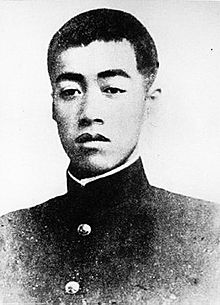Lin Juemin
Chinese revolutionary From Wikipedia, the free encyclopedia
Lin Juemin (traditional Chinese: 林覺民; simplified Chinese: 林觉民; pinyin: Lín Juémín; Wade–Giles: Lin Chüeh-min; born 11 August 1887 – 27 April 1911) was a late Qing dynasty revolutionary.[1][2][3][4][5][6][7][8][9][10]
Lin Juemin | |
|---|---|
 | |
| Birth name | Lin Juemin |
| Born | 11 August 1887 Minhou, Fujian, Qing Empire |
| Died | 27 April 1911 (aged 23) Guangzhou, Qing Empire |
| Cause of death | Execution |
| Allegiance | Tongmenghui |
| Service | Tongmenghui |
| Years of service | 1911 |
| Battles / wars | Second Guangzhou Uprising |
| Alma mater | Keio University |
| Relations | Chen Yiying (wife) |
| Lin Juemin | |||||||
|---|---|---|---|---|---|---|---|
| Traditional Chinese | 林覺民 | ||||||
| Simplified Chinese | 林觉民 | ||||||
| |||||||
Biography
In 1907, Lin traveled to Japan to study at Keio University, where he joined Dr. Sun Yat-sen's revolutionary group, the Tongmenghui. Lin attempted to begin a popular revolution in 1911 in Guangzhou after returning to his native Fujian, but he was arrested and his revolution failed. 3 days before his capture, he wrote his famous "Letter of Farewell to my Wife", which is considered an important work of Chinese writing of the early 20th century. He was remembered as a revolutionary martyr after his death.[11]

American artist Maya Lin is related to him.
In popular culture

See also
References
Bibliography
Wikiwand - on
Seamless Wikipedia browsing. On steroids.
